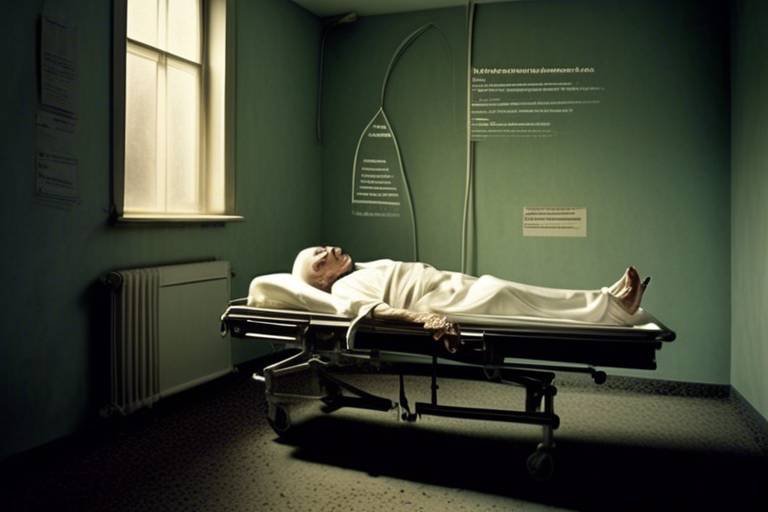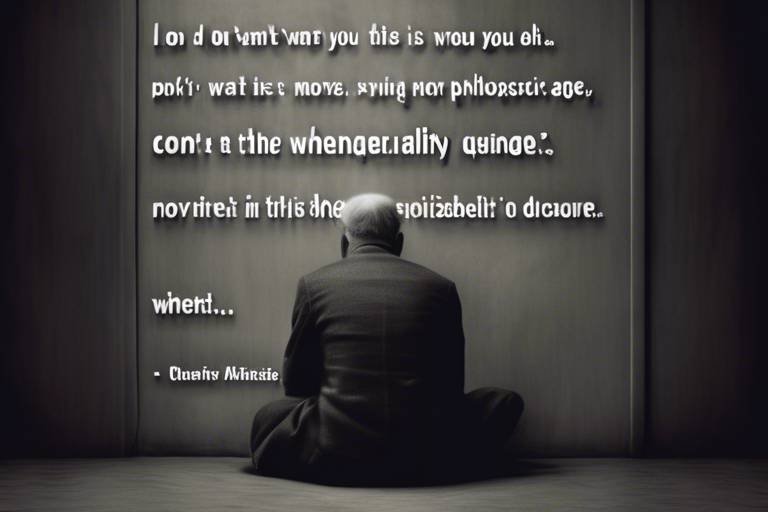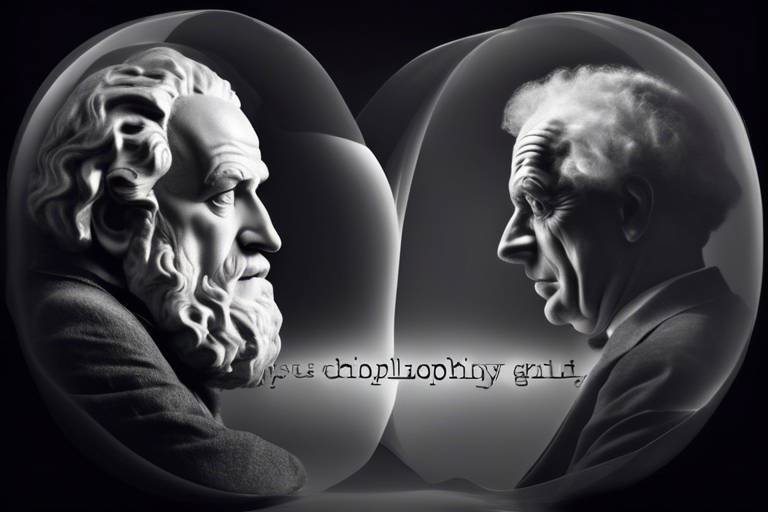Understanding Euthanasia from a Philosophical Perspective
Euthanasia, often described as "mercy killing," evokes a whirlwind of emotions and ethical considerations. It raises profound questions about the value of life, the right to choose one's fate, and the moral responsibilities of those involved. As we navigate this intricate landscape, we must consider the philosophical underpinnings that shape our understanding of euthanasia. The debate is not merely about legality or medical ethics; it touches on the very essence of human existence and the autonomy we hold over our own lives.
At its core, euthanasia challenges us to confront the **ethical dilemmas** that arise when life and death decisions are placed in human hands. Should individuals have the right to end their suffering, or does society bear a responsibility to preserve life at all costs? This philosophical inquiry is not just academic; it has real-world implications for patients, families, and healthcare providers. As we delve deeper into the ethical frameworks that inform this debate, we will explore various theories, cultural perspectives, and legal aspects that contribute to our understanding of euthanasia.
Philosophical discussions about euthanasia often hinge on several key ethical theories:
- Utilitarianism: This approach advocates for actions that maximize happiness and reduce suffering. Supporters of euthanasia may argue that allowing individuals to choose death can alleviate unbearable pain and enhance overall well-being.
- Deontology: Rooted in the belief that certain actions are inherently right or wrong, deontologists may oppose euthanasia on the grounds that it violates the moral duty to preserve life.
- Virtue Ethics: This perspective emphasizes the character and intentions behind actions. Advocates may argue that showing compassion through euthanasia aligns with virtuous behavior, while opponents might contend that it reflects a failure to uphold moral virtues.
As we explore these ethical frameworks, it becomes evident that the conversation surrounding euthanasia is not black and white. The implications of these theories extend beyond personal beliefs and into the realm of societal norms and legal practices. Understanding euthanasia through a philosophical lens allows us to engage in a more nuanced dialogue about life, autonomy, and the human condition.
What is euthanasia?
Euthanasia is the practice of intentionally ending a person's life to relieve them from suffering, often in the context of terminal illness or unbearable pain.
Is euthanasia legal everywhere?
No, the legality of euthanasia varies significantly across different countries and regions. Some places have legalized it under strict conditions, while others maintain a complete ban.
What are the main ethical arguments for and against euthanasia?
Proponents argue for individual autonomy and the relief of suffering, while opponents often cite the sanctity of life and moral obligations to preserve life.
How do cultural perspectives influence views on euthanasia?
Cultural beliefs, particularly religious views, play a significant role in shaping attitudes toward euthanasia, leading to diverse opinions based on tradition and social values.

The Ethical Framework of Euthanasia
The topic of euthanasia is not just a matter of personal choice; it is deeply embedded in a web of ethical considerations that challenge our understanding of morality, autonomy, and the value of life. When we talk about euthanasia, we must navigate through various ethical theories that provide different lenses through which we can view this complex issue. Three primary ethical frameworks often come into play: utilitarianism, deontology, and virtue ethics. Each of these theories offers unique insights and raises significant questions about the morality of euthanasia.
Utilitarianism, for instance, is a consequentialist theory that suggests the best action is the one that maximizes overall happiness or utility. In the context of euthanasia, proponents argue that allowing individuals to choose death can relieve suffering, thus enhancing overall well-being. Imagine a terminally ill patient enduring immense pain with no hope of recovery. From a utilitarian perspective, granting that patient the option of euthanasia could be seen as a compassionate choice that minimizes suffering not only for the individual but also for their loved ones. However, critics of this viewpoint caution against a slippery slope where the value of life could be undermined in favor of perceived utility.
On the other hand, deontology focuses on the morality of actions themselves rather than their outcomes. This perspective is often associated with the philosopher Immanuel Kant, who argued that certain actions are inherently right or wrong, regardless of their consequences. From a deontological standpoint, euthanasia may be viewed as morally unacceptable because it involves intentionally ending a life, which can be seen as a violation of the duty to preserve life. This raises profound questions: Is it ever justifiable to take a life, even if the intention is to alleviate suffering? Deontologists argue that we must uphold the sanctity of life, suggesting that euthanasia undermines this fundamental principle.
Virtue ethics, rooted in the teachings of Aristotle, emphasizes the importance of character and the virtues that a moral agent should cultivate. This approach invites us to consider what a virtuous person would do in situations involving euthanasia. Would a person embodying compassion and empathy support euthanasia, or would they prioritize the preservation of life? The answer may vary among individuals, reflecting personal values and societal norms. This ethical framework encourages a more nuanced discussion, inviting us to consider how our choices align with the virtues we aspire to embody.
It’s essential to recognize that these ethical frameworks do not exist in isolation. They often intersect and influence each other, creating a rich tapestry of moral reasoning surrounding euthanasia. For instance, while a person may be inclined to support euthanasia from a utilitarian perspective, they might still grapple with deontological objections based on their moral upbringing. Understanding these frameworks can help us navigate the often turbulent waters of ethical decision-making regarding euthanasia, allowing us to engage in more informed and empathetic discussions.
In summary, the ethical framework surrounding euthanasia is complex and multifaceted. By examining utilitarianism, deontology, and virtue ethics, we gain a deeper understanding of the moral dilemmas at play. Each framework offers valuable insights that can guide our thinking and discussions about euthanasia, but they also challenge us to confront our beliefs about life, death, and the nature of suffering. As we continue to explore these ethical dimensions, we must remain open to dialogue and reflection, recognizing that the answers are not always clear-cut.
- What is euthanasia? Euthanasia is the practice of intentionally ending a person's life to relieve them from suffering, often due to terminal illness.
- Is euthanasia legal everywhere? No, euthanasia laws vary significantly across different countries and regions, with some places permitting it under strict regulations while others prohibit it entirely.
- What are the main ethical arguments for and against euthanasia? Supporters often cite autonomy and relief from suffering, while opponents may argue against the sanctity of life and potential for abuse.
- How do cultural perspectives influence the debate on euthanasia? Cultural and religious beliefs play a significant role in shaping attitudes towards euthanasia, affecting both public opinion and legal frameworks.

Cultural Perspectives on Euthanasia
The concept of euthanasia is not just a medical or ethical dilemma; it is deeply intertwined with cultural beliefs and societal norms that vary significantly across the globe. Each culture brings its own set of values, traditions, and historical contexts that shape attitudes towards euthanasia. For instance, in some societies, the idea of ending a life to alleviate suffering is seen as a compassionate act, while in others, it is viewed as a moral failing or a violation of sacred beliefs. Understanding these cultural perspectives is crucial for a comprehensive discussion on euthanasia.
At the heart of cultural attitudes towards euthanasia are the influences of religion, tradition, and social values. In many cultures, religious beliefs dictate the moral framework within which euthanasia is evaluated. For example, in predominantly religious societies, life is often considered a divine gift, and the act of taking it—regardless of the circumstances—can be seen as a transgression against a higher power. Conversely, in more secular societies, the emphasis may be placed on individual autonomy and the right to choose one's destiny, including the decision to end one’s own suffering.
To illustrate the diversity of cultural perspectives on euthanasia, let's consider a few key regions:
| Region | Cultural Attitude | Legal Status |
|---|---|---|
| North America | Generally more accepting in certain states, emphasizing personal autonomy. | Legal in some states (e.g., Oregon, California). |
| Europe | Varies widely; countries like the Netherlands and Belgium have progressive laws. | Legal in several countries; strict regulations apply. |
| Asia | Often influenced by Confucian values, prioritizing family and societal harmony. | Generally illegal; discussions are ongoing. |
| Middle East | Strong religious opposition; life is considered sacred. | Illegal; cultural taboos against euthanasia. |
As we can see, the cultural landscape surrounding euthanasia is complex and multifaceted. In regions where euthanasia is legally accepted, the dialogue often centers around the principles of autonomy and compassion. Advocates argue that individuals should have the right to choose a dignified death, especially in cases of unbearable suffering. On the other hand, in cultures where euthanasia is frowned upon, the emphasis is placed on the sanctity of life, with many believing that suffering can have a purpose or that it is a natural part of the human experience.
Moreover, societal values play a significant role in shaping these perspectives. In cultures that prioritize individualism, personal choice is often valued above collective beliefs. In contrast, collectivist societies may prioritize family wishes and community norms, leading to a more conservative stance on euthanasia. This divergence highlights the importance of context when discussing euthanasia, as what may be acceptable in one culture could be completely unacceptable in another.
As we navigate these complex cultural perspectives on euthanasia, it becomes clear that discussions must be approached with sensitivity and an understanding of the underlying beliefs that inform these views. Engaging in open dialogue can foster greater understanding and respect for differing opinions, ultimately contributing to a more nuanced approach to the ethical and legal considerations surrounding euthanasia.
- What is euthanasia? Euthanasia refers to the practice of intentionally ending a person's life to relieve them of suffering, often in cases of terminal illness.
- Is euthanasia legal everywhere? No, the legality of euthanasia varies by country and even within regions of countries. Some places have legalized it under strict regulations, while others have prohibited it entirely.
- How do cultural beliefs influence euthanasia? Cultural beliefs, especially religious and societal values, significantly shape attitudes towards euthanasia, affecting both personal opinions and legal policies.

The Role of Religion
Religion profoundly influences the discourse surrounding euthanasia, shaping the moral compass of individuals and communities alike. For many, faith provides a framework through which the complexities of life and death are navigated. When it comes to euthanasia, religious beliefs often dictate whether the act is viewed as a compassionate choice or a moral transgression. This divergence in perspectives can lead to heated debates, as adherents grapple with the teachings of their faith against the backdrop of personal experiences and societal pressures.
Different religions approach the issue of euthanasia with varying degrees of acceptance or rejection. For instance, many Abrahamic faiths—including Judaism, Christianity, and Islam—tend to uphold the sanctity of life, viewing euthanasia as incompatible with divine will. Conversely, some Eastern religions may adopt a more nuanced stance, focusing on the alleviation of suffering and the concept of karma. This divergence raises important questions: How do these beliefs shape the choices individuals make at the end of life? And what implications do these choices have on broader societal norms?
To illustrate the diversity in religious perspectives on euthanasia, consider the following table:
| Religion | View on Euthanasia |
|---|---|
| Judaism | Generally opposes euthanasia, emphasizing the sanctity of life. |
| Catholicism | Strongly opposes euthanasia, advocating for the preservation of life. |
| Islam | Opposes euthanasia, viewing it as contrary to the will of Allah. |
| Buddhism | May support euthanasia in certain circumstances to relieve suffering. |
In Judaism, for example, the belief that life is a gift from God leads to the general prohibition against euthanasia. The concept of Pikuach nefesh, which prioritizes saving a life, further complicates the issue, as it suggests that one must do everything possible to preserve life, even in the face of suffering. This theological stance creates a strong community ethos against euthanasia, influencing the choices of individuals and families in times of crisis.
Similarly, the Catholic Church's teachings are rooted in the belief that life is sacred and that only God has the authority to end it. The Church's position is clear: euthanasia is morally unacceptable, as it undermines the inherent dignity of human life. This perspective is often echoed by Catholic followers, who may feel torn between their faith and the desire to alleviate suffering for a loved one.
In contrast, some secular and Eastern religious perspectives may offer a different lens through which to view euthanasia. For instance, Buddhism emphasizes the alleviation of suffering and may support euthanasia under certain conditions, as it aligns with the principle of compassion. This more flexible approach can lead to a more individualized interpretation of what constitutes a "good death," allowing for personal autonomy in making end-of-life decisions.
As we navigate the complex landscape of euthanasia, it is crucial to recognize the role that religion plays in shaping opinions and guiding decisions. While some may find solace in their faith's teachings, others may feel constrained by them. Ultimately, understanding these diverse perspectives can foster a more empathetic dialogue about euthanasia, encouraging individuals to consider not only their beliefs but also the beliefs of others as they confront the profound questions of life and death.
- What is euthanasia? Euthanasia refers to the practice of intentionally ending a person's life to relieve suffering, often in cases of terminal illness.
- How do religious beliefs influence views on euthanasia? Different religions have varying teachings about the sanctity of life, which can significantly impact followers' opinions on euthanasia.
- Are there any religions that support euthanasia? While most major religions oppose euthanasia, some Eastern philosophies, like Buddhism, may support it under specific circumstances to alleviate suffering.
- What are the ethical implications of euthanasia? Ethical discussions surrounding euthanasia often focus on issues of autonomy, the relief of suffering, and the moral responsibilities of healthcare providers.

Judaism holds a profound reverence for life, viewing it as a sacred gift from God. This belief fundamentally shapes the Jewish perspective on euthanasia, which is generally opposed within the community. The theological reasoning behind this stance is deeply rooted in the teachings of the Torah and Talmud, where the sanctity of life is emphasized. In Jewish law, known as Halacha, life is considered invaluable, and taking a life, even with the intention of alleviating suffering, is seen as a violation of divine commandments.
One of the core principles in Judaism is the concept of Pikuach Nefesh, which prioritizes saving a life above almost all other commandments. This principle underscores the belief that every moment of life is significant and should be preserved. Therefore, even in cases of unbearable pain or terminal illness, the act of euthanasia is often viewed as a premature end to a life that should be allowed to unfold until its natural conclusion.
Furthermore, Jewish thought emphasizes the importance of suffering and its role in human existence. Many Jewish scholars argue that suffering can lead to personal growth and spiritual refinement. This perspective does not negate the pain experienced by individuals facing terminal illnesses but suggests that there is intrinsic value in enduring suffering as part of the human experience. Consequently, the option of euthanasia is often seen as a way to escape this suffering, which is not aligned with the Jewish understanding of life's trials.
Despite the prevailing opposition to euthanasia, there are nuanced discussions within Jewish communities regarding the quality of life and the ethical implications of prolonged suffering. Some modern Jewish thinkers advocate for a more compassionate approach, arguing that alleviating suffering may sometimes justify the consideration of euthanasia. However, these views remain controversial and are not widely accepted.
In summary, Judaism's stance on euthanasia is primarily shaped by its deep-seated belief in the sanctity of life, the importance of suffering, and the obligation to preserve life. While there are ongoing discussions within the community, the predominant view remains one of opposition to euthanasia, emphasizing the value of every human life and the spiritual lessons that can arise from suffering.
- What is the Jewish view on euthanasia?
Judaism generally opposes euthanasia, viewing life as sacred and emphasizing the importance of preserving life until its natural end. - How does suffering relate to Jewish beliefs?
Suffering is seen as a part of the human experience that can lead to personal growth and spiritual refinement. - Are there any exceptions in Jewish law regarding euthanasia?
While the predominant view is opposition, some modern Jewish thinkers discuss the ethical implications of suffering and may advocate for compassionate approaches.

Catholicism holds a firm position against euthanasia, rooted deeply in the belief that life is a sacred gift from God. This perspective is not merely a matter of doctrine; it encompasses a profound understanding of human dignity and the intrinsic value of every life, regardless of its circumstances. The Catholic Church teaches that intentionally ending a life, even to alleviate suffering, undermines the sanctity of life and contradicts God's plan for humanity. The Catechism of the Catholic Church explicitly states that "euthanasia is morally unacceptable" (CCC 2277), emphasizing the importance of palliative care and the moral obligation to care for the sick and suffering.
The Church's position is influenced by a broader theological framework that prioritizes the concept of suffering. In Catholic thought, suffering can have a redemptive quality, providing individuals with an opportunity to unite their pain with Christ's suffering. This view encourages the faithful to approach end-of-life issues with compassion and understanding rather than resorting to euthanasia. The Church advocates for a holistic approach to end-of-life care, focusing on pain management and emotional support rather than hastening death.
Moreover, Catholic teaching emphasizes the importance of community and family in the dying process. The Church encourages families to support their loved ones through difficult times, fostering an environment where love and care can flourish. By providing spiritual support and guidance, the Church believes that individuals can find peace and acceptance in their suffering, rather than seeking to escape it through euthanasia.
The implications of this stance extend beyond individual beliefs; they influence the broader societal dialogue about euthanasia. Many Catholics are actively involved in advocacy for laws that protect the vulnerable and promote compassionate care rather than assisted dying. This perspective is crucial in shaping public policy and healthcare practices, as it calls for a society that values life and seeks to alleviate suffering through means that respect human dignity.
In summary, Catholicism's stance on euthanasia is a complex interplay of theological beliefs, ethical considerations, and a commitment to human dignity. The Church's unwavering opposition to euthanasia is not just a matter of doctrine but a call to embrace suffering as part of the human experience and to provide compassionate care to those in need. As society grapples with the moral dilemmas surrounding euthanasia, the Catholic perspective serves as a reminder of the value of life and the importance of supporting one another in times of suffering.
- What is the Catholic Church's official position on euthanasia? The Catholic Church opposes euthanasia, viewing it as morally unacceptable and contrary to the sanctity of life.
- How does the Church view suffering? The Church sees suffering as having redemptive value and encourages individuals to unite their suffering with that of Christ.
- What alternatives does the Church suggest for end-of-life care? The Church advocates for palliative care and emotional support, emphasizing the importance of community and family involvement.
- How does Catholic teaching influence public policy on euthanasia? Catholic beliefs often shape advocacy efforts to promote laws that protect life and provide compassionate care rather than assisted dying.

The conversation surrounding euthanasia often navigates through a complex maze of ethical considerations, particularly from a secular standpoint. Unlike religious frameworks that may impose divine commandments, secular ethics rely primarily on human reason, personal autonomy, and the alleviation of suffering. One of the most compelling arguments in favor of euthanasia is the principle of **autonomy**—the idea that individuals have the right to make decisions about their own lives, including the choice to end it under certain circumstances. This perspective raises a critical question: If a person is suffering intolerably and wishes to end their life, should they not have the right to do so?
Moreover, the **relief of suffering** is a cornerstone of secular ethical arguments. Many proponents of euthanasia argue that it is a compassionate response to unbearable pain, akin to how we might choose to ease the suffering of a beloved pet. Imagine watching a loved one endure relentless agony with no hope for recovery; the instinct to alleviate their suffering becomes a powerful motivator for supporting euthanasia. This analogy highlights the fundamental belief that minimizing suffering should be a priority in healthcare and ethical decision-making.
However, the secular approach to euthanasia is not without its challenges. Critics often raise concerns about the potential for **abuse** and the slippery slope argument, suggesting that legalizing euthanasia could lead to unintended consequences, such as coercion or the devaluation of life, particularly for vulnerable populations. Therefore, it becomes essential to establish robust safeguards and regulations that ensure euthanasia is performed ethically and consensually. These safeguards might include thorough psychological evaluations, mandatory waiting periods, and clear documentation of the patient’s wishes.
To better understand the secular ethical considerations, let’s look at a few key principles that underpin this debate:
- Autonomy: Individuals have the right to make choices about their own bodies and lives.
- Beneficence: Actions should promote the well-being and relieve suffering of individuals.
- Non-maleficence: The obligation to not inflict harm intentionally.
- Justice: Ensuring fair access to euthanasia options for all individuals, regardless of socio-economic status.
In conclusion, the secular ethical considerations surrounding euthanasia invite us to reflect deeply on the values we hold dear as a society. By prioritizing autonomy and the relief of suffering, while also addressing concerns about potential abuses, we can foster a more compassionate and informed dialogue about this sensitive issue. As we continue to explore the implications of euthanasia, it’s crucial to remember that behind every decision lies a human story—one that deserves to be heard and respected.
- What is euthanasia? Euthanasia is the practice of intentionally ending a person's life to relieve them from suffering, often in cases of terminal illness.
- Is euthanasia legal everywhere? No, the legality of euthanasia varies widely across different countries and regions, with some places allowing it under strict regulations while others prohibit it entirely.
- What are the ethical arguments for euthanasia? Proponents argue for autonomy, the relief of suffering, and the importance of compassionate care as key ethical considerations in favor of euthanasia.
- How do healthcare professionals approach euthanasia? Healthcare professionals must navigate complex ethical responsibilities, ensuring informed consent and adhering to legal guidelines while considering the patient's wishes.

The legality of euthanasia is a multifaceted issue that varies significantly across different jurisdictions. In some countries, euthanasia is fully legalized, while in others, it remains a criminal offense. This divergence in legal frameworks not only reflects the cultural attitudes towards death and dying but also poses numerous ethical dilemmas for healthcare providers, patients, and lawmakers alike. Understanding these legal aspects is crucial for anyone interested in the euthanasia debate, as they directly impact the rights of individuals and the responsibilities of medical professionals.
In jurisdictions where euthanasia is legal, strict regulations are often put in place to ensure that the process is ethically conducted. For instance, many laws require that patients demonstrate a clear and persistent wish to end their lives, often necessitating psychological evaluations to confirm that the decision is made without coercion. Additionally, healthcare providers involved in euthanasia must adhere to specific protocols, which may include obtaining informed consent and ensuring that all alternative treatments have been explored.
To illustrate the varying legal landscapes, consider the following table that summarizes the status of euthanasia in several countries:
| Country | Status of Euthanasia | Key Regulations |
|---|---|---|
| The Netherlands | Legal | Must meet strict criteria; patient must be experiencing unbearable suffering. |
| Belgium | Legal | Includes minors under certain conditions; requires a second opinion. |
| United States | Varies by state | Legal in a few states (e.g., Oregon); requires terminal illness diagnosis. |
| Australia | Legal in some states | Strict eligibility criteria; must be a resident of the state where it is legal. |
| India | Illegal | Supreme Court ruling allows passive euthanasia under strict conditions. |
As we can see from the table, the legal status of euthanasia not only varies by country but also reflects broader societal values regarding life, death, and individual autonomy. In places where euthanasia is legal, it is often framed as a matter of personal choice and dignity. However, critics argue that legalizing euthanasia could lead to potential abuses, particularly concerning vulnerable populations who may feel pressured to choose death over life due to societal or familial expectations.
Healthcare professionals are at the forefront of this legal landscape, navigating the complex interplay between patient rights and legal obligations. They must ensure that they are well-informed about the laws in their jurisdiction and remain vigilant against any potential ethical conflicts that may arise in the practice of euthanasia. This underscores the importance of ongoing education and dialogue within the medical community about the implications of euthanasia laws.
As society continues to grapple with the question of euthanasia, legal frameworks will undoubtedly evolve. Potential future changes may include broader acceptance of euthanasia in more regions, or alternatively, stricter regulations aimed at safeguarding against misuse. Regardless of the direction these discussions take, it is essential for all stakeholders—patients, families, healthcare providers, and lawmakers—to engage in open and honest conversations about the implications of euthanasia on individual rights and societal values.
- Is euthanasia legal in my country? - The legality of euthanasia varies widely, so it’s important to research your specific country’s laws.
- What are the criteria for euthanasia? - Criteria typically include being of sound mind, experiencing unbearable suffering, and having a terminal illness in jurisdictions where it is legal.
- How do healthcare providers approach euthanasia? - Providers must adhere to legal protocols and ensure that patients are fully informed and consenting.
- What are the ethical concerns surrounding euthanasia? - Ethical concerns include the potential for coercion, the sanctity of life, and the implications for vulnerable populations.

Euthanasia, often a contentious topic, is treated very differently across the globe. Understanding the legal status of euthanasia can provide insight into how various cultures and societies approach end-of-life decisions. Some countries have embraced euthanasia, allowing it under specific conditions, while others maintain strict prohibitions. This variation reflects not only legal frameworks but also deeply ingrained cultural beliefs and ethical considerations.
In countries like the Netherlands and Belgium, euthanasia is legal and regulated. These nations have established comprehensive laws that outline the conditions under which euthanasia can be performed. In the Netherlands, for instance, the Termination of Life on Request and Assisted Suicide (Review Procedures) Act allows adults who are experiencing unbearable suffering with no prospect of improvement to request euthanasia. The law requires that multiple healthcare professionals evaluate the situation to ensure that the decision is well-informed and voluntary.
Conversely, in places like the United States, the legality of euthanasia varies significantly by state. While some states, such as Oregon and Washington, have legalized physician-assisted suicide through Death with Dignity laws, others remain firmly opposed to any form of euthanasia. This patchwork of laws can create confusion and inconsistency, leaving patients and families grappling with complex decisions at one of the most challenging times in their lives.
| Country | Legal Status | Key Regulations |
|---|---|---|
| Netherlands | Legal | Must meet criteria of unbearable suffering; reviewed by multiple doctors |
| Belgium | Legal | Similar to Netherlands; includes minors under specific conditions |
| Oregon (USA) | Legal (Physician-Assisted Suicide) | Patient must be terminally ill; two oral requests required |
| Germany | Legal (Assisted Suicide) | Not classified as euthanasia; focused on assisted suicide |
| India | Legal (Passive Euthanasia) | Supreme Court ruling in 2018 allows passive euthanasia under strict conditions |
| United Kingdom | Illegal | Assisted suicide remains a criminal offense; ongoing debates |
In contrast, many countries in Asia and Africa have strict laws against euthanasia. For instance, in India, while active euthanasia remains illegal, passive euthanasia was recognized by the Supreme Court in 2018 under specific conditions. This nuanced approach highlights the complexities surrounding the topic, balancing traditional values with modern ethical considerations.
The role of healthcare professionals in these legal frameworks cannot be overstated. In countries where euthanasia is permitted, medical practitioners must navigate a labyrinth of ethical and legal responsibilities. They are tasked with ensuring that patients are fully informed and that their requests are genuine, free from coercion or undue influence. The emphasis on informed consent is paramount, as it underscores the importance of patient autonomy in these sensitive situations.
As the global conversation around euthanasia continues to evolve, it's essential to remain aware of how different countries approach this deeply personal issue. The legal landscape is not static; it is influenced by changing societal values, medical advancements, and ongoing ethical debates. Understanding these differences can help foster a more compassionate dialogue about end-of-life choices, respecting both individual autonomy and cultural contexts.
In conclusion, the legal status of euthanasia varies widely around the world, reflecting a tapestry of cultural beliefs, ethical considerations, and legal frameworks. As societies grapple with the complexities of life and death, the discussions surrounding euthanasia will undoubtedly continue to challenge and shape our understanding of morality, dignity, and personal choice.
- What is euthanasia? Euthanasia is the practice of intentionally ending a person's life to relieve suffering, typically in cases of terminal illness.
- Is euthanasia legal everywhere? No, euthanasia laws vary significantly by country and even within regions of countries.
- What are the ethical considerations surrounding euthanasia? Ethical considerations include debates over individual autonomy, the sanctity of life, and the role of healthcare professionals.
- How do healthcare professionals approach euthanasia? Healthcare professionals must navigate legal and ethical responsibilities, ensuring informed consent and evaluating the patient's condition.
- What countries have legalized euthanasia? Countries like the Netherlands, Belgium, and some states in the USA have legalized euthanasia under specific conditions.

When it comes to the sensitive topic of euthanasia, healthcare professionals find themselves at the crossroads of ethics, law, and patient care. They are not just medical providers; they are also critical players in the ethical landscape that surrounds end-of-life decisions. Imagine being a doctor or nurse, holding the weight of someone's life and death in your hands. It's a heavy burden, and it comes with a multitude of responsibilities that can often feel overwhelming.
First and foremost, healthcare professionals are tasked with ensuring that patients are fully informed about their options. This means providing clear, unbiased information about the process of euthanasia, including the potential outcomes and consequences. Informed consent is not just a legal requirement; it is a moral obligation. It allows patients to make decisions that align with their values and beliefs. But how can healthcare providers navigate this delicate conversation? They must approach it with empathy and understanding, recognizing the emotional turmoil that patients and their families are experiencing.
Moreover, healthcare professionals must grapple with their own beliefs and ethical frameworks. Many may find themselves conflicted, torn between their duty to alleviate suffering and their personal or institutional values that may oppose euthanasia. This internal struggle can lead to significant stress and burnout among practitioners. Therefore, it is essential for healthcare systems to provide support, including access to counseling and discussions with ethics committees, to help professionals cope with these challenges.
Another critical aspect of their role is the collaboration with multidisciplinary teams. Healthcare professionals must work closely with social workers, psychologists, and legal advisors to ensure that all aspects of a patient's care are considered. This teamwork is vital in creating a comprehensive care plan that respects the patient's wishes while adhering to legal and ethical standards. The following table illustrates the various roles that different healthcare professionals might play in the euthanasia process:
| Healthcare Professional | Role in Euthanasia |
|---|---|
| Physician | Evaluates the patient's medical condition and provides information about euthanasia options. |
| Nurse | Offers emotional support and assists in the administration of euthanasia procedures. |
| Social Worker | Facilitates discussions about the patient's wishes and offers support to families. |
| Psychologist | Assesses the patient's mental health and ensures they are making informed decisions. |
| Legal Advisor | Ensures compliance with laws and regulations surrounding euthanasia. |
Ultimately, the role of healthcare professionals in euthanasia is multifaceted and complex. They must not only provide medical care but also engage in ethical discussions, support patients emotionally, and collaborate with other professionals. This holistic approach is crucial in ensuring that euthanasia is conducted ethically and compassionately, respecting the dignity and autonomy of the patient. As society continues to evolve in its views on euthanasia, the role of healthcare providers will undoubtedly remain vital in shaping the conversations and practices surrounding this deeply personal choice.
- What is euthanasia? Euthanasia is the practice of intentionally ending a person's life to relieve them from suffering, often in cases of terminal illness.
- Are healthcare professionals allowed to perform euthanasia? The legality of euthanasia varies by jurisdiction, and healthcare professionals must adhere to local laws and ethical guidelines.
- How do healthcare professionals support patients considering euthanasia? They provide information, emotional support, and ensure that patients understand their options, all while respecting their autonomy.
- What ethical dilemmas do healthcare professionals face regarding euthanasia? They may struggle with their personal beliefs, the expectations of their institution, and the legal implications of their actions.

The conversation around euthanasia is not just a fleeting topic; it is a dynamic discourse that evolves alongside societal values, legal frameworks, and medical practices. As we look to the future, several implications emerge that could significantly alter how euthanasia is perceived and practiced. One major factor is the ongoing debate surrounding **individual autonomy**. As more people advocate for the right to choose their end-of-life options, we may see a shift towards more permissive laws regarding euthanasia. This could lead to a scenario where patients feel empowered to make decisions about their own lives, akin to choosing a career path or lifestyle. However, with this empowerment comes the responsibility to ensure that such choices are made with **informed consent** and without coercion.
Moreover, the potential for **legal changes** is a hot topic. Countries that currently have restrictive laws may begin to reconsider their stance as public opinion shifts. For instance, if more jurisdictions recognize the ethical arguments surrounding the relief of suffering, we could witness a domino effect, where one country’s progressive laws inspire others to follow suit. Conversely, there is also the risk of backlash from conservative groups who may push back against any perceived erosion of traditional values, leading to a complex tug-of-war over the future of euthanasia laws.
Another significant consideration is the role of **healthcare professionals** in this evolving landscape. As the practice of euthanasia becomes more mainstream, healthcare providers will face ethical dilemmas that challenge their personal beliefs and professional responsibilities. The need for comprehensive training on euthanasia practices, including the psychological aspects of patient care, will become increasingly important. This training could help ensure that healthcare professionals are equipped to handle these sensitive discussions with empathy and respect, ultimately leading to better patient outcomes.
Additionally, advancements in **medical technology** may influence the euthanasia debate. With innovations in pain management and palliative care, some argue that euthanasia may become less necessary as patients experience less suffering. However, this raises the question: if we can alleviate suffering, should we still consider euthanasia as a viable option? This is a profound ethical dilemma that will require careful consideration as technology continues to advance.
Finally, the implications of euthanasia extend beyond individual cases; they ripple through society, shaping public policy and cultural norms. As more countries engage in discussions about euthanasia, we may see a broader acceptance of the notion that individuals have the right to choose their own destiny, including the manner of their death. This cultural shift could lead to greater emphasis on **end-of-life planning**, where discussions about death become normalized rather than taboo. Such changes could foster a society that is more compassionate and understanding of the complexities surrounding death and dying.
- What is euthanasia? Euthanasia refers to the practice of intentionally ending a person's life to relieve them from suffering, often in cases of terminal illness.
- Is euthanasia legal everywhere? No, euthanasia laws vary significantly by country and region. Some places allow it under strict conditions, while others prohibit it entirely.
- What are the ethical concerns surrounding euthanasia? Ethical concerns include the sanctity of life, the potential for abuse, and the importance of informed consent.
- How do cultural perspectives influence euthanasia laws? Cultural beliefs, particularly those shaped by religion and tradition, significantly influence how societies view and regulate euthanasia.
- What role do healthcare professionals play in euthanasia? Healthcare professionals are often involved in discussions about euthanasia, providing care and guidance to patients considering their options.
Frequently Asked Questions
-
What is euthanasia?
Euthanasia refers to the practice of intentionally ending a person's life to relieve them of suffering, typically in cases of terminal illness or unbearable pain. It's a complex and often controversial topic that raises ethical, moral, and legal questions.
-
Is euthanasia legal everywhere?
No, euthanasia is not legal everywhere. The legality varies significantly from country to country, and even within regions of a country. Some places have legalized it under strict regulations, while others completely prohibit it. It's essential to understand the laws specific to your location.
-
What are the main ethical arguments for euthanasia?
Proponents of euthanasia often argue from the standpoint of individual autonomy, suggesting that people should have the right to choose to end their suffering. Additionally, the relief of pain and the quality of life are significant factors in these discussions, as many believe that prolonged suffering is inhumane.
-
What are the religious perspectives on euthanasia?
Religious perspectives on euthanasia can vary widely. For instance, many religions, such as Judaism and Catholicism, oppose it, emphasizing the sanctity of life. However, other faiths may have more nuanced views that allow for compassionate considerations in cases of extreme suffering.
-
How do healthcare professionals approach euthanasia?
Healthcare professionals often face ethical dilemmas regarding euthanasia. Their responsibilities include ensuring informed consent, understanding legal implications, and balancing their moral beliefs with patient needs. The role of doctors and nurses is crucial in navigating these sensitive discussions.
-
What are the potential future trends regarding euthanasia?
As societal values evolve, discussions around euthanasia are likely to continue. Potential trends may include changes in legal frameworks, increased acceptance of euthanasia in certain cultures, and ongoing debates about ethical considerations and patient rights.



















